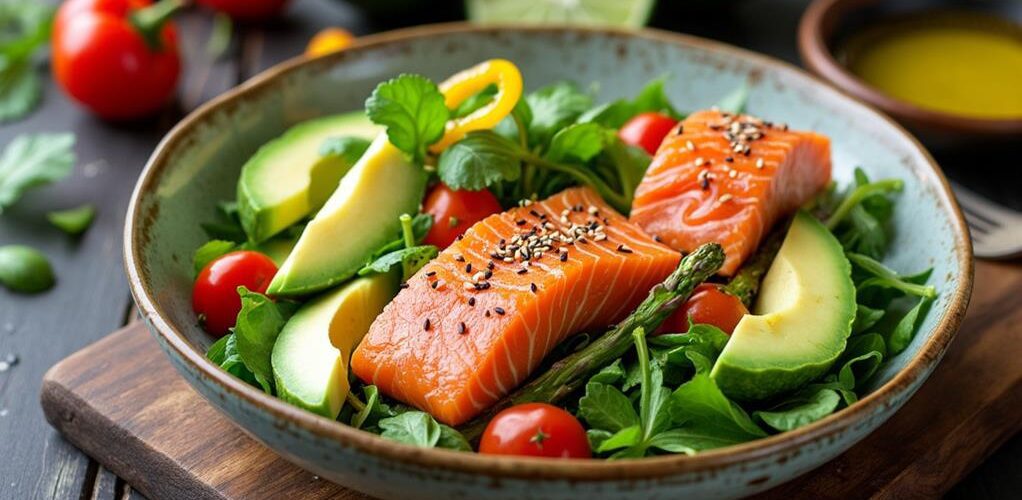
To increase healthy fat intake on a keto diet, consider incorporating avocados and avocado oil, which provide heart-healthy monounsaturated fats. Snack on nuts and nut butters like almonds and walnuts for additional healthy fats. Use seeds like flax, chia, and hemp hearts in salads and smoothies. Add olives and extra virgin olive oil to dishes for their anti-inflammatory properties. Cook with coconut oil and use coconut milk for their medium-chain triglycerides. Include fatty fish and eggs to guarantee you get omega-3s and essential nutrients. Finally, enjoy full-fat dairy products such as heavy cream, Greek yogurt, and cheese to maintain ketosis. Explore these tips for more thorough strategies.
Key Takeaways
- Incorporate Avocados: Add avocados to your meals for a rich source of monounsaturated fats and fiber.
- Use Coconut Oil: Cook with coconut oil for MCTs that are quickly converted to energy.
- Snack on Nuts: Choose high-fat nuts like walnuts and macadamias for healthy, calorie-dense snacks.
- Add Olive Oil: Use extra virgin olive oil in dressings and marinades to boost heart-healthy fats.
- Include Fatty Fish: Consume fatty fish like salmon and mackerel for omega-3 fatty acids and essential fats.
Incorporate Avocado and Avocado Oil
Integrating avocados and avocado oil into your keto diet can substantially enhance its nutritional profile. Avocados boast an impressive array of benefits, primarily due to their rich content of heart-healthy monounsaturated fats, which provide about 15 grams of fat per medium avocado. This fat content can aid in enhancing satiety, an essential factor for those adhering to a ketogenic diet.
Not only do avocados offer healthy fats, but they also contribute to gut health due to their fiber and nutrient density.
Avocado oil, with its high oleic acid content, presents an excellent option for dressings or cooking, adding healthy fats without increasing carbohydrate intake, as it contains zero carbs. This makes it an ideal component in keto-friendly meals.
A serving of avocado (approximately 1/3 of a medium fruit) provides 5 grams of fiber, contributing to digestive health and offering essential vitamins and minerals. Regular consumption of avocados has been linked to balanced blood sugar levels, supporting ketosis and overall metabolic health.
Additionally, the versatility of avocados in culinary applications cannot be overstated. From guacamole to smoothies and salad toppings, there are numerous avocado recipes that can seamlessly integrate this nutrient-dense fruit into your keto diet, optimizing both flavor and nutritional benefits.
Snack on Nuts and Nut Butters
Incorporating nuts and nut butters into your keto diet can greatly enhance your intake of healthy fats, with options like walnuts, macadamias, and almonds providing 15-20 grams of fat per ounce.
Nut butters, such as almond and peanut butter, offer a convenient way to boost fat intake, provided they are free from added sugars and hydrogenated oils.
Creative snack ideas include pairing a handful of mixed nuts for satiety or incorporating nut butters into smoothies and desserts for a nutrient-dense, flavorful experience.
Additionally, pumpkin seeds are a great option, offering a mix of protein and healthy fats.
Types of Nut Butters
Offering a delicious and nutritious way to maintain fat intake on a keto diet, nut butters such as almond butter, peanut butter, and coconut butter are excellent choices for snacking.
Almond butter benefits include its low carbohydrate content—around 3.4 grams per tablespoon—combined with a substantial 8.4 grams of healthy fats, making it a nutrient-dense option. This makes almond butter an ideal choice for those looking to sustain their fat intake while keeping carbs low.
Peanut butter, on the other hand, provides approximately 4 grams of carbohydrates and 8 grams of fat per tablespoon, along with remarkable protein content. Its versatility allows for various peanut butter recipes that can be seamlessly integrated into a keto diet, such as smoothies, fat bombs, and even keto-friendly desserts.
Coconut butter stands out with its unique flavor and slightly higher calorie content. Each tablespoon contains about 9 grams of fat, contributing a different fat profile that can enhance the diversity of a keto diet.
However, it is essential to practice portion control due to the calorie-dense nature of nut butters. Adhering to recommended serving sizes can help avoid excess calorie intake while still reaping the nutritional benefits.
Nutrient Profiles of Nuts
While nut butters provide a delectable way to maintain fat intake on a keto diet, the whole nuts themselves also offer substantial nutritional benefits that make them an excellent snacking option. Nuts are an excellent source of healthy fats, offering diverse nutrients essential for a well-rounded keto diet. For instance, one ounce of almonds delivers approximately 14 grams of fat, 6 grams of protein, and 3.5 grams of fiber, making them a nutrient-dense choice.
Walnuts stand out among nut varieties due to their high omega-3 fatty acid content, with one ounce providing about 18 grams of fat. This composition makes walnuts particularly beneficial for heart health and inflammation reduction.
Similarly, pistachios offer a more calorie-conscious option, containing around 13 grams of fat and 6 grams of protein per ounce, consequently aiding in maintaining calorie balance while still providing substantial nut benefits.
Nut butters, such as almond or peanut butter, mirror these benefits, offering approximately 8 grams of protein and 16 grams of fat per two-tablespoon serving.
However, it is essential to check labels to avoid added sugars and unhealthy oils that can disrupt ketosis. By incorporating these nutrient-rich nut varieties, one can effectively enhance their keto diet.
Creative Snack Ideas
For those adhering to a keto diet, snacking intelligently can greatly enhance nutritional intake and maintain ketosis. Nuts like almonds, walnuts, and macadamias are excellent sources of healthy fats, providing around 14-20 grams of fat per ounce. Nut butters, such as almond and peanut butter, offer a creamy alternative with 16-18 grams of fat per two-tablespoon serving. These options not only satisfy hunger but also contribute considerably to daily fat targets essential for ketosis.
To maximize benefits, choose nut butters without added sweeteners or hydrogenated oils. Pairing nuts with cheese or full-fat Greek yogurt creates a balanced snack rich in both protein and healthy fats. Additionally, integrating seeds like chia, flax, and pumpkin seeds into your snack routine can further enhance fat intake; for example, flaxseeds offer about 18 grams of fat and 11 grams of fiber per quarter-cup serving.
Here are some creative snack ideas to inspire your keto journey:
| Snack Idea | Healthy Fat Source | Pairing Suggestion |
|---|---|---|
| Almonds and Cheese | Almonds (14g fat/oz) | Cheddar Cheese |
| Walnut Greek Yogurt Dip | Walnuts (18g fat/oz) | Full-fat Greek Yogurt |
| Macadamia Nut Butter | Macadamias (20g fat/oz) | Keto friendly dips |
| Savory Nut Mixes with Seeds | Mix of nuts & seeds | Pumpkin, chia, flax seeds |
Incorporating these snacks into your diet guarantees a sustained energy supply while keeping you on track with your keto goals.
Use Seeds in Your Meals
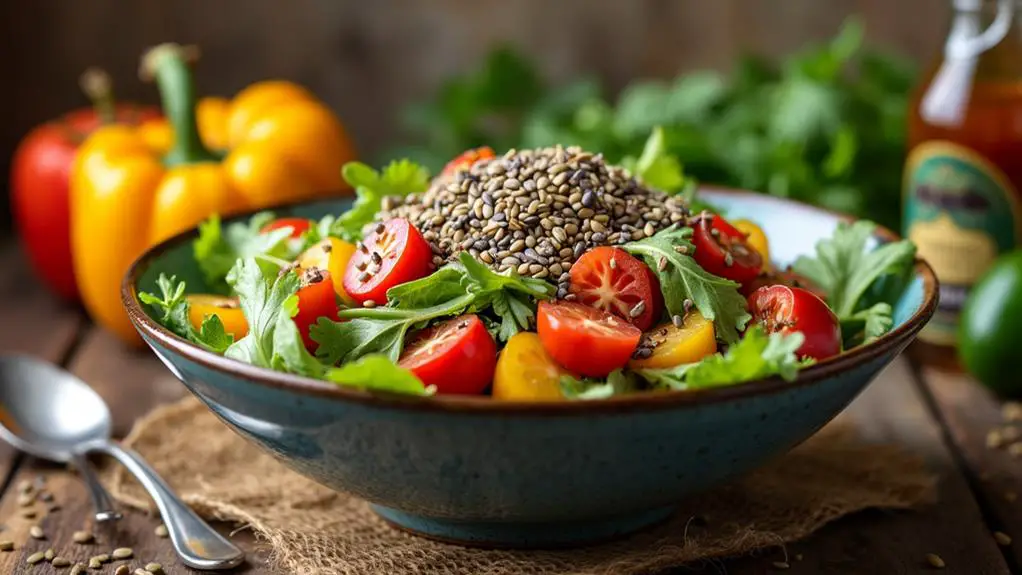
Incorporating seeds into your keto meals can greatly enhance nutrient intake, offering healthy fats, fiber, and essential proteins.
Flax seeds, chia seeds, and hemp hearts not only contribute to heart health and digestion but also add varied textures to your dishes.
Versatile in their application, seeds can be seamlessly integrated into smoothies, salads, and baked goods, making them a practical and nutritious addition to your diet.
Boost Nutrient Intake
Enhancing your nutrient intake on a keto diet can be effectively achieved by incorporating various types of seeds into your meals. Seeds are not only excellent sources of healthy fats but also offer substantial fiber, essential for digestive health and overall well-being.
Here are some key seed benefits to take into account:
- Flax Seeds: A quarter cup of flax seeds provides an impressive 18g of fat and 11g of fiber. These seeds are exceptional fiber sources that support heart health and digestive function.
- Chia Seeds: Incorporating chia seeds into smoothies or puddings contributes 4g of fat and 4g of fiber per tablespoon. These seeds help maintain satiety and possess anti-inflammatory properties.
- Hemp Hearts: With 15g of fat and a complete plant-based protein profile in just three tablespoons, hemp hearts enhance nutrient diversity and are ideal for salads or yogurt.
Additionally, pumpkin seeds serve as a crunchy topping rich in healthy fats and essential minerals like magnesium and zinc.
Cacao nibs, with 12g of fat per ounce, are high in fiber, supporting gut health while adding a delicious chocolate flavor to snacks or desserts.
Enhance Meal Texture
To maximize the benefits of nutrient-dense seeds, it's also advantageous to contemplate how they can enhance the texture of your meals.
Seed selection plays a vital role in achieving ideal texture enhancement while adhering to a keto diet. For instance, flax seeds, providing 18g of fat and 11g of fiber per quarter cup, can be sprinkled on salads or integrated into baked goods for added crunch and nutritional value.
Chia seeds, known for their ability to absorb liquid and form a gel-like consistency, are perfect for creating creamy puddings and thickening smoothies, contributing 4g of fat and 4g of fiber per tablespoon.
Their unique texture can transform a simple dish into a rich, satisfying meal.
Hemp hearts, with their complete protein profile and 15g of fat in three tablespoons, can be seamlessly added to salads and yogurt, providing a tender yet crunchy texture that enhances the overall eating experience.
Additionally, incorporating ground seeds into sauces or dressings can introduce creaminess and richness, making them an excellent low-carbohydrate option for texture enhancement.
Versatile Recipe Additions**
Numerous seeds can serve as versatile additions to various recipes, enhancing both nutrition and texture while adhering to a keto diet. Incorporating seeds like flax, chia, and hemp hearts into your meals can provide essential fats and fibers, contributing to overall health and wellness.
Flax seed benefits are notable for their high fiber and fat content. Adding one-quarter cup of flax seeds to smoothies or baked goods can offer 11g of fiber and 18g of fat, which supports heart health and digestion. Moreover, ground flax seeds can be seamlessly integrated into recipes for energy bites or protein bars without greatly altering the flavor.
Chia seed recipes offer another excellent option for increasing healthy fats. Just one tablespoon of chia seeds provides 4g of fat and 4g of fiber. They can be added to puddings or yogurt, enhancing both texture and nutritional value. Additionally, blending chia seeds with olive oil and vinegar creates a nutritious, keto-friendly salad dressing.
Hemp hearts also deserve attention for their substantial fat content and complete plant-based protein profile. Three tablespoons of hemp hearts contain 15g of fat and can be sprinkled on salads or oatmeal to promote overall health.
- Flax seeds: Smoothies, baked goods, energy bites
- Chia seeds: Puddings, yogurt, salad dressings
- Hemp hearts: Salads, oatmeal
Add Olives and Olive Oil
Incorporating olives and olive oil into your keto diet can greatly boost your intake of heart-healthy fats while also providing essential nutrients like vitamin E. Olives are rich in monounsaturated fats, which are known to support heart health. A serving of 10-15 olives contains approximately 5-10 grams of healthy fats, making them a nutritious snack that aligns with keto dietary goals.
The olive benefits extend beyond just their fat content; they are also a good source of antioxidants and can help reduce inflammation. Additionally, olives contribute to increasing omega-3 fatty acids, which are beneficial for heart health.
Extra virgin olive oil (EVOO) is another excellent way to increase healthy fat intake on a keto diet. EVOO uses are diverse: it can be incorporated into salad dressings, marinades, or simply drizzled over cooked dishes to enhance flavor.
Using olive oil for sautéing or roasting vegetables not only boosts their fat content but also adds a rich and savory taste. Additionally, incorporating olive oil into your meals can support overall heart health by reducing inflammation, an important consideration for those on a high-fat diet.
Hence, both olives and olive oil are versatile and beneficial additions to a keto diet.
Cook With Coconut and Coconut Oil
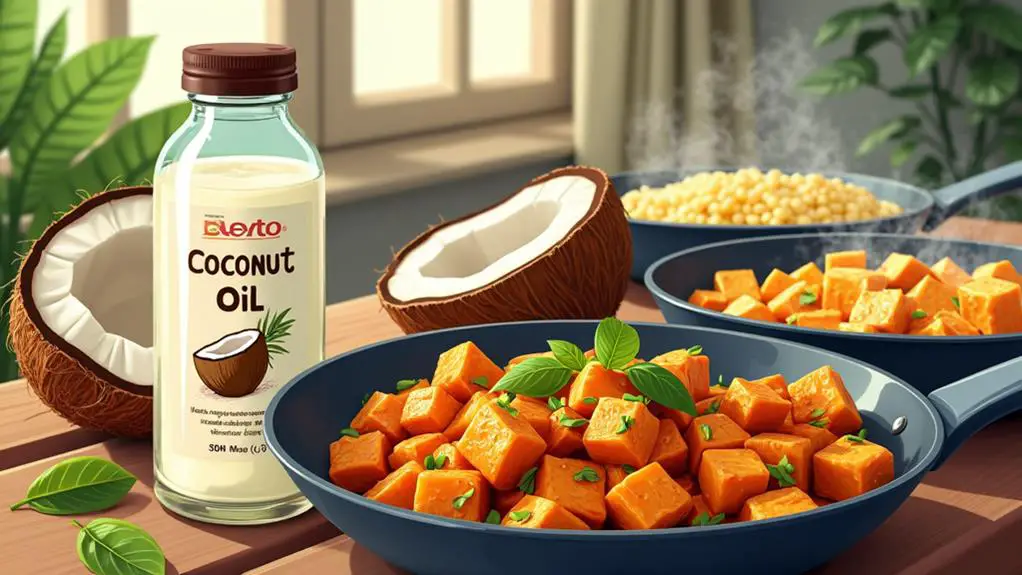
Cook With Coconut and Coconut Oil
When aiming to enhance your keto diet, coconut and coconut oil offer an array of nutritional benefits that support your health goals. Coconut oil is a rich source of medium-chain triglycerides (MCTs), which can be quickly converted to energy and support ketosis. This makes it a valuable addition to any keto regimen.
Furthermore, full-fat coconut milk adds a creamy texture to recipes while providing approximately 5g of healthy fats per tablespoon. Coconut oil also boasts antibacterial and antifungal properties, enhancing its health benefits.
Incorporating coconut products can be simplified with some basic cooking techniques:
- High-Temperature Cooking: Coconut oil has a high smoke point (around 350°F), making it ideal for sautéing and baking without breaking down.
- Creamy Additions: Use full-fat coconut milk in soups and sauces for added fat and richness.
- Toppings and Mix-ins: Unsweetened coconut flakes can be sprinkled on meals or snacks, adding both healthy fat and fiber, with about 18g of fat per 1/4 cup serving.
Coconut benefits extend to various forms, such as coconut butter, which can be easily blended into smoothies or desserts.
This versatility provides a unique flavor while contributing meaningfully to your overall fat intake, essential for maintaining a well-balanced keto diet.
Include Fatty Fish and Eggs
While coconut and coconut oil provide substantial benefits for a keto diet, another cornerstone of this eating plan is the inclusion of fatty fish and eggs. Fatty fish such as salmon, mackerel, and sardines are rich sources of omega-3 fatty acids. These essential fats help reduce inflammation and support heart health, providing a notable amount of healthy fats essential for a keto-friendly meal plan.
For instance, a 3.5-ounce serving of salmon contains approximately 20 grams of fat, making it an excellent option to boost your fat intake alongside high-quality protein. Including fatty fish in your diet can also contribute to improved insulin sensitivity, which is beneficial for managing type 2 diabetes.
Whole eggs, another versatile and nutrient-dense food, offer about 5 grams of fat per large egg, along with essential vitamins and antioxidants that promote overall health. The variety in egg preparation methods—scrambled, boiled, or poached—ensures that meal ideas remain diverse and interesting, which is critical for long-term dietary adherence.
Incorporating fatty fish into your meals two to three times a week, combined with daily egg consumption, can considerably enhance flavor, satiety, and nutritional balance. This approach not only helps in achieving the high fat intake required for ketosis but also provides substantial health benefits, ensuring a sustainable and enjoyable keto diet.
Enjoy Full-Fat Dairy Products
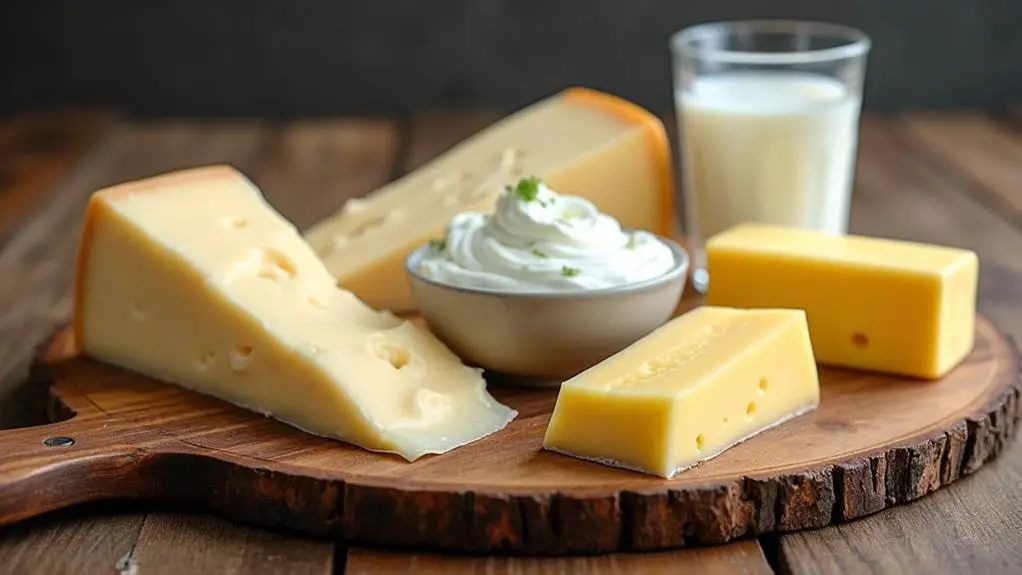
Full-fat dairy products serve as a cornerstone in the ketogenic diet, offering both rich flavor and a substantial source of healthy fats essential for maintaining ketosis. Heavy cream, cheese, and full-fat Greek yogurt are prime examples, each providing significant fat content: heavy cream contains about 5 grams of fat per tablespoon, and full-fat Greek yogurt offers approximately 6 grams of fat per 150-gram serving.
These dairy products are also low in carbs, with full-fat cheese like cheddar containing just 1 gram of carbs per ounce. Full-fat benefits extend beyond simple fat content. Incorporating cheeses like cheddar and brie introduces valuable protein, calcium, and beneficial probiotics, which support gut health. These components are vital for a balanced keto diet, enhancing overall nutrition while maintaining low carbohydrate intake.
For practical application, consider these dairy recipes:
- Soups and Sauces: Use heavy cream to enrich soups and sauces, providing a creamy texture and significant fat content.
- Breakfast Boosts: Add full-fat Greek yogurt to your morning routine for a high-fat, low-carb start to the day.
- Savory and Sweet Dishes: Employ cream cheese or mascarpone to create creamy textures in both savory and sweet dishes, enhancing meal satisfaction.
Opting for full-fat versions over low-fat alternatives helps avoid added sugars and carbohydrates, vital for supporting keto dietary goals.
Frequently Asked Questions
How Do I Increase My Fat on Keto?
To increase fat on keto, focus on incorporating diverse fat sources through strategic meal planning. Utilize olive oil, avocado, full-fat dairy, nuts, seeds, and fat bombs to achieve balanced, nutrient-dense meals while maintaining ketosis effectively.
What Happens if I Don't Eat Enough Fat on Keto?
If fat deficiency occurs on a keto diet, it can hinder weight loss by preventing ketosis, increase hunger due to low satiety, cause nutrient deficiencies, and lead to symptoms like fatigue and muscle loss, undermining diet effectiveness.
What Are the Best Fats for Keto Diet?
The best fats for a keto diet include olive oil, coconut butter, avocado oil, nut butters, and MCT oil. Additionally, incorporating cheese varieties, fatty fish, grass-fed beef, ghee options, and chia seeds can optimize your dietary fat intake.
How Do I Get Fat Adapted to Keto?
To achieve keto adaptation, gradually reduce carbohydrate intake while increasing healthy fats to 70-80% of daily calories. Incorporating MCTs and tracking macronutrient intake will optimize fat metabolism, facilitating a smoother conversion to ketosis.
Conclusion
To sum up, achieving an ideal ketogenic diet requires strategic incorporation of high-fat foods. Avocado and avocado oil, nuts and nut butters, seeds, olives and olive oil, coconut and coconut oil, fatty fish and eggs, and full-fat dairy products are essential components. These foods not only enhance the fat content but also provide necessary nutrients. Adhering to these guidelines can facilitate the maintenance of ketosis, thereby promoting the diet's intended benefits.
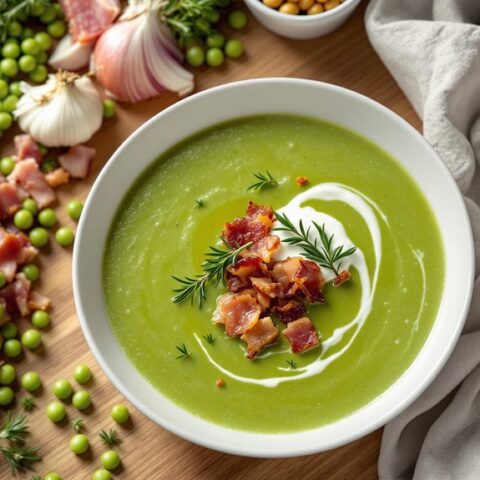
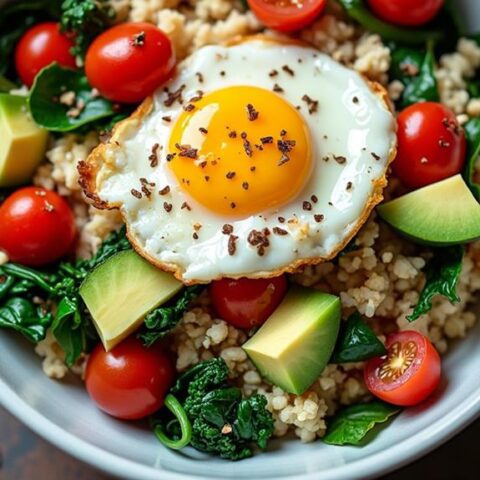
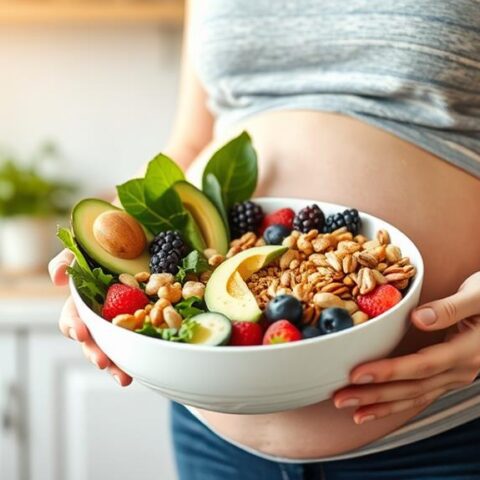
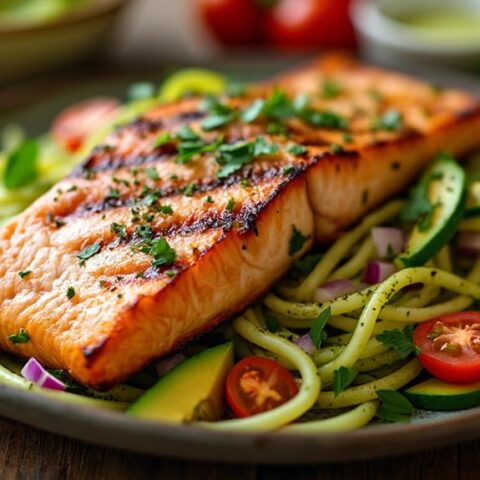
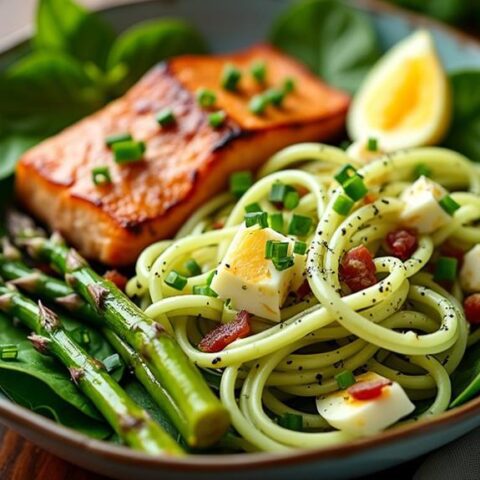





No Comments